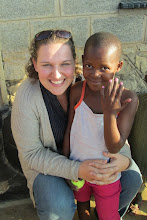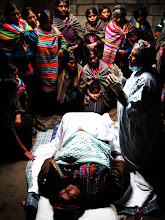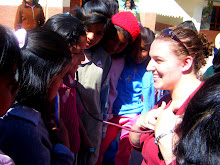A few miles outside the camptown, Botha-Bothe, the taxi driver swerved to the side of the road. As the door rolled open for the waiting, road-side passengers, I saw a young woman waiting to climb on. She was wrapped in a traditional kobo (blanket), that held a peacefully sleeping infant snug against her back. On her hip she masterfully balanced a squirming little boy. The ground at her feet was covered with a small pile of mis-matched luggage, an immediate give-away that, like me, she was making a cross country trip.
As the other passengers found seats near the back of the noisy and overcrowded taxi, I watched her eyes dart towards the front seat, where I sat alone. I saw the momentary hesitancy, as she struggled to decide how to juggle her load. Then her eyes briefly met mine. It was a single moment. An unspoken understanding. A dance repeated by Basotho women, day-after-day on dusty-road-after-dusty-road, across Lesotho... Without hesitating, I reached out to take the sleeping baby she offered me.
In America, having a complete stranger reach for your child, without a single word of introduction would be untenable. In Lesotho, it's expected. Desired. Needed. Women help women. Mothers support mothers. For Basotho women, mothering is an act of an entire community. Anyone's child is everyone's child. Women frequently feed and care for children that are not their own, in such a way that village friends are often raised with the closeness of siblings. So after more than a year and a half living in Lesotho, this dance has become second nature to me. It's an unspoken understanding that, if my lap is empty of other luggage, a child or infant is welcomed to it.
After some logistical rearranging, we finally settled in side-by-side, sharing the small space with two children and an overwhelming pile of luggage. In my arms, I held a large, yet deceptively light bundle, with a sleeping baby girl nestled deep inside. 'Me attempted to fruitlessly settle the squirming and active toddler.
"U ea kae, 'Me?" (Where are you going, mother?), I asked.
"Maseru," she smiled wearily.
"Le na," (And me) I echoed quietly, in agreement. "U lula Maseru?" (You live in Maseru?)
And there we were... Two women. Bound in solidarity to a single mission.
About an hour into the trip, the baby in my lap awoke. Chubby, little fingers reached out of the nest of blankets to explore the foreign texture of my dangling curls and bright earrings. The heavy winter blanket left pools of sweat on my arms and legs, that slowly soaked through my clothes, making them stick to me uncomfortably. As the mountains of Lesotho flew by at a distance, I couldn't help but marvel at how different child-rearing practices could be between two cultures. I am certain I have photographic evidence, tucked away in some secret box in the top of a closet, that I spent most of my infancy running around defiantly without clothes. Yet Basotho religiously swaddle their infants in mountains of blankets, even in the heat of summer. A practice which makes me certain that the childhood risk of suffocation far outweighs that of catching a trifling cold.
After a while, the interest in my foreign hair and clothing was not enough to outweigh the needs of an empty stomach. 'Me and I slowly shuffled loads... The hungry, crying infant to her; the now moderately pacified little boy to me. At the sight of his sister nursing, however, my new friend started to stir restlessly. I dug into the bottom of my bag, searching for a misplaced banana I'd bought at a roadside fruit stand a few hours back. In true childlike manners, his sticky fingers covered my hands and arm in banana before he nestled in to sleep on my chest. Without a word, only a knowing smile, 'Me dug into a big green bag for a small towel and reached over to wipe a chunk of banana off my forearm. Eventually the satiated infant also slept, and we settled in for several more hours on the sweltering and constantly stopping taxi. I'll never understand how Basotho babies manage to sleep through blaring fame music, honking horns, and the obnoxious calls of the taxi conductor out the window, "Palama! Palama! Ua palama, Ntate?!" (Get on! Get on! You're getting on, Ntate?!)







